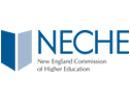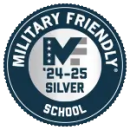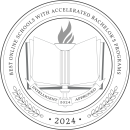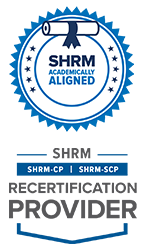Complete 108 credits.
Explore Human Resource Management
The need for highly skilled human resource management professionals has never been greater. Designed for both current HR professionals with entry-level expertise and those looking to enter the field, our bachelor of human resource management degree will equip you with the training and development needed to work in the growing field of human resources. As an HR professional, you will be a necessary asset to nearly all employment sectors and businesses and will be prepared for a variety of fast-paced, diverse, and challenging work environments.
Our human resources degree will teach you the fundamentals and best practices of HR including human relations skills such as recruitment, onboarding new employees, developing and retaining employees, labor relations, using HR data to inform decision-making, prioritizing the health, safety, and wellness of employees, and more. Graduates with an online bachelor’s degree in human resource management are able to use these competencies to solve complex HR-related issues and make strategic decisions to successfully fulfill an organization’s talent vision.
Finish your program faster with credit for prior learning and experience.
Differentiate your degree and get your resume noticed with an added certificate. Speak with your advisor for information.
Build Your Career Future
The role of HR within organizations is continuing to shift from purely administrative functions to becoming a strategic partner in attaining organizational goals. Today’s professionals must be agile and approach challenges with a systems-thinking mindset.
To ensure you receive a top-quality education in human resource management and that you’re trained in today’s most important human resources content areas, we aligned our HR degree online with the Society for Human Resource Management (SHRM) HR Curriculum Guidebook and Templates. This incredible distinction means our HR management degree is among the most comprehensive, up-to-date curriculums in HR, addressing current issues in the field, providing you with necessary subject matter expertise, and training you in essential HR competencies like the employee lifecycle, employee wellness, and employee mental health, which have become increasingly important issues to organizations today. Additionally, our curriculum focuses heavily on foundational business skills and in-demand soft skills - like communication, critical thinking, and leadership - that can increase both your immediate job prospects and your long-term career potential.
As you explore your career in HR, you may decide to become a SHRM certificated professional (SHRM-CP). While it is not required that you earn a degree in HR to sit for the exam, students who complete our B.S. in HR management program are eligible and prepared for the SHRM-CP certification.
Champlain College Online is recognized by SHRM to offer Professional Development Credits (PDCs) for SHRM-CP® or SHRM-SCP®.
Program Curriculum
Learn more about Champlain's 100% online human resource management bachelor's degree, designed for working professionals.
Champlain's online business management courses encompass the top skills needed by today's business professionals. Graduates of the program are required to complete the following courses.
Core Courses (51 credits)
General Education Courses (42 credits)
General Electives (27 credits)
Human Resource professionals have to be keenly aware of the employee lifecycle (ELC) - a method used to visualize how an employee engages with a company. The first stage of the ELC is attraction. Regardless of how strong your company is, without attracting great talent, your company will fail. The second stage, recruitment, is the period where you seek out and recruit the best talent to join your organization.
Occurring after human resource professionals have recruited top talent, the onboarding period is critical to getting new hires well-adjusted to the organizational environment and performance aspects of their new job. During the development period, HR professionals begin to consistently encourage professional development among their teams, which acts as a catalyst in their skill development and also helps provide them with a future career path within the company.
This course provides students with a comprehensive overview of U.S. employment law, emphasizing the legal and regulatory issues that impact the workplace. Students will explore the foundational elements of the employment relationship and key laws governing hiring, compensation, workplace safety, discrimination, employee rights, and termination. Designed for future human resource professionals and business managers, the course integrates legal theory with practical application, helping students understand how to navigate compliance, mitigate legal risks, and promote ethical employment practices in today's evolving work environment.
This course introduces the core terminology and principles of marketing. Students learn about the marketing mix (product, price, place, and promotion), market segmentation, and how external factors such as the economy, technology, culture, and competition influence marketing decisions. The course also examines how marketing fits within an organization and contributes to business success, along with how ethical considerations, cultural awareness, global trends, and social responsibility shape marketing practices across industries. No prior business experience is required.
Compensation and Benefits will provide students a detailed understanding of how to develop a Total Rewards Program (TRP), and the strategic choices employers make when selecting TRP financial terms. The course covers the implementation of compensation strategies, benefits packages, work-life balance programs, performance and service recognition strategies, and career development strategies.
Employee retention is focused on keeping top employees, and ensuring they're happy and sufficiently challenged in their respective roles within the organization. The influence of company culture goes a long way in this lifecycle stage. If the culture in the organization is poor, it inevitably leads to high employee turnover rates. In the event an employee leaves the organization, approaching the separation process strategically is critical. When a team member leaves, it has an effect on other members.
Students will learn about the application of positive individual and group strengths and capacities that can be recognized, evaluated, and expanded to advance organizational well-being. This course encourages students to apply positive organizational behavior processes to everyday challenges organizations face to drive positive workplace behaviors and outcomes. This course also helps students to practice and gain skills, knowledge, and competencies to become positive and impactful leaders and change-makers from whatever position they hold.
Students learn about the complex safety and wellness programs that must be delivered by every employer in order to ensure an environment that is conducive to productive work. They will learn about the wide range of employer safety programs including substance abuse, ergonomics, OSHA, work-life balance, leave of absences and many others that HR supports the business in developing and delivering. Students will also consider the opportunity for employee wellness programs and how to design and implement a wellness plan.
In today's highly technical world, the Human Resources Information System (HRIS) is the backbone of most HR services and programs. Students will gain an understanding of the business case for implementing an HRIS including the needs assessment and planning needed and will explore the wide range of components that can be part of the HRIS ranging from Training and Development to Talent Management. Students will also develop an understanding of the shift towards supporting employee self-service via HRIS.
The HR profession is rapidly changing and growing and today's HR professionals need to actively engage in their own career development. Students will gain an understanding of the career planning process and how to leverage it across early and mid career evolution, and will actively apply key HR competencies in relation to career planning including Relationship Management, Ethical Practice, Communication among others. Students will also develop a deeper understanding of planning their own career in HR.
In order to retain employees in today's highly competitive environment, employers must design jobs that are attractive and performance management experiences that are rich in feedback and are designed to reward and retain the best talent. Students will explore the legal aspects of job design and performance management as well as the goals of those programs, and look at the elements of performance management including performance cycles, improvement plans, and feedback loops.
Through the power of data, people analytics are essential for employers to attract, develop and retain employees. Students will make connections between HR data and business strategy and decision-making. They will learn about the power of using HR data to conduct analytics across the HR performance areas and will explore analytics in the context of HR metrics, benchmarking, scorecards, and learning how to unlock the power of data to reduce bias and improve performance.
Students will learn how to create conditions for successful conflict engagement, a necessary skill for any professional. The course focuses on the foundational capacities to remain calm and connected with oneself and others. In this state students can access helpful ideas and responses and be their best selves regardless of environment. Improving facility for conflict creates stronger relationships and reduces fear. By the end of the course, students will understand that disagreement and difference can become a source of personal and interpersonal growth.
Students will explore the history of labor relations in America and how the role of HR has evolved. Students will also explore the complex legal environment, the role of labor unions as employee advocates, and will engage in dispute resolution, collective bargaining, and grievance topics.
Today's organizations are increasingly global and HR must adapt by developing global strategies, policies and processes. Students will explore current issues in global HR management as well as gain an understanding of the global business environment and how it impacts HR practices. Students will also learn about immigration laws and the various issues that can arise as businesses operate across country borders, and will consider key aspects of operating globally including cross-cultural effectiveness and managing virtual teams.
Strategic Human Resource Management is a combination of strategy and human resource management that seeks to achieve competitive advantage through the strategic utilization of a committed, talented workforce using an integrated approach to engaging and developing the talent in an organization. Students will learn about the evolution of the HR function as well as HR's role in creating a competitive advantage for an organization. They will also learn how to build strategic relationships and develop into a strategic partner, and will also explore HR's role in social responsibility.
Prerequisites
In this final course for CPS business majors, you will complete a comprehensive project that integrates the knowledge you have gained throughout your business program into a work-based learning activity. You will work collaboratively with the instructor, your peers, and, if you choose to, a mentor. Through the project, relevant readings and discussion,you will become reflective and integrative thinkers and self-directed learners.
Prerequisites
108 completed credits
In addition to the following requirements, students must also complete 3 Credits of a General Education Elective (Any ARTS, COMM, CRIT, ECON, ENGL, HIST, MATH, PHIL, PSYC, SCIE, SOCI, MKCM 120, CRIM except CRIM-225)
This course introduces students to the foundational concepts needed to communicate effectively in writing for academic study and professional development. Students will also learn to read critically to evaluate an author's message. Students will be introduced to rhetorical modes and their role in the development of written communication. Students will also learn how to use revision strategies to create written communication that meets its intended purpose for its intended audience
This course builds on students' proficiency in the writing process and rhetorical modes to introduce the use of sources in written communication. Students will practice information literacy as they learn to determine information needs from sources, develop effective search strategies, and incorporate sources in written communication, legally and ethically.
Prerequisites
Complete ENGL-100
Starting with a frame of human communication as a dynamic system of interactions in which people make choices that impact their relationships, other people, and themselves, students will define theory-informed communication concepts and processes, and critically examine how they apply to everyday life across a variety of contexts. Students will reflect on how the theory, concepts and processes apply to their own lives in becoming competent communicators who are knowledgeable, skilled, and versatile.
This course examines the principles of effective small group interaction. Students will analyze group development stages and small group roles. They will identify and evaluate communication skills that enhance small group cohesion and problem-solving. Students will explain how conflict affects group processes and compare face-to-face versus digital collaboration environments. These skills prepare students to participate effectively in group settings across academic, professional, and community contexts.
Students will learn and apply critical inquiry skills to analyze persuasive communication created by others and to develop persuasive communication/arguments of their own to solve problems in professional, civic, social, and personal contexts. Specifically, students will learn to recognize fallacies in logic; apply inductive and deductive reasoning strategies to the interpretation and development of persuasive communication; evaluate the validity of sources; and develop logically sound persuasive communication. Students will explore the roles of self-awareness, empathy, and ethics in the context of critical inquiry and the development of arguments.
Prerequisites
Complete ENGL-110.
This course is an historical overview, and examination of the evolution of digital, film, and print media, and their functions. Students will identify and analyze contemporary problems of the media such as the legal, social, economic and psychological implications of their relationships with society. They also will examine the ways in which marketing and PR professionals utilize the mass media channels to reach their intended target audiences.
This course explores the complex and evolving relationship between human beings and technology. Through a multi-disciplinary approach that draws on fields such as sociology, psychology, philosophy, and history, students will examine the ways in which technology has shaped human culture, identity, and values, as well as how humans have influenced and continue to influence the development, adoption and use of technology.
Mathematical reasoning, when applied to everyday and professional lives, has two dimensions: logic for deterministic situations and probabilities for non-deterministic situations. This course aims to help students develop these mathematical reasoning skills.
This course introduces students to basic statistics for data literacy. With a focus on exploring real-world data, students will interpret numerical information and utilize the tools necessary to complete the entire statistical process: designing a study; gathering, organizing, and analyzing sample data; and making inferences about a population. Students will demonstrate data-driven decision-making and effective communication of numerical data.
Introduces students to the biochemistry and physiology of nutrition and exercise. Emphasis will be placed on human body systems such as musculoskeletal, digestive, respiratory and circulatory, and their relationship to nutrition and fitness. Students will also study the biochemistry of energy conversion as it relates to exercise physiology. Laboratory sessions are designed to reinforce, by a hands-on approach, the principles discussed in lecture. Course includes two laboratory hours per week.
Students will develop the ability to apply scientific methods to understand the natural world, to identify scientific aspects of daily life, and to evaluate the quality of scientific information based on its source and the methods used for its generation.
In this course, students will gain an introduction to classical mechanics and learn about motion, force, energy, and momentum. The course covers vectors, scalars, and coordinate systems, as well as kinematics in one and two dimensions, Newton's Laws of Motion, circular motion, and kinetic energy and work. Students also learn about potential energy and energy conservation, collision theory, rotational motion, moment of inertia, torque, rotational dynamics, and angular momentum.
This course will introduce students to major streams of social justice thought, including historical social justice movements, theoretical problems having to do with social equality, personal freedom, marginalization, and stigmatization, and the ways in which civic and professional communities respond to these issues.
With pressure and release, a window opens and closes, recording light on a sensor. The simple action captures the instinct, judgement, and skill of the person behind the lens. This class will begin a study of the art and craft of photography. Students will develop their vision and their understanding of how to achieve it. Solid skills will be learned and many doors will be opened.
A survey of the continuing change experienced in art since the 15th century. Students will examine how an image is achieved as well as the significance of the subject represented. Individual inquiry concerning the nature of art is encouraged.
Students learn to appreciate films through the critical analysis of various elements of mise-en-scene, cinematography, editing and sound. The course introduces the conventions of classical Hollywood cinema, considers the work of one major director (auteur), and surveys selected international and independent films. Students view and discuss films each week.
Students in the course will explore the cultural history of the music genre broadly referred to as rock. Students will explore the social, economic and political contexts that are influenced by and that influenced each style in the United States. By listening, watching, reflecting upon, discussing and writing, students will explore how music takes on meaning, personally, and culturally. Topics and themes include the relationships between and among gospel, country, funk, folk, disco, rap and hip hop; the role of business and technology in those relationships, and political or transgressive elements of rock music.
Specific application of common tools for writing in the working world. Students will be instructed in rhetorical strategies of professional writing including style, report formats, editing, document design, and integration of visual aids. Students will complete a semester-long writing project; oral and written reports associated with the process of problem-solving within the project will be included.
Prerequisites
ENGL-112 or COR-125
Students will learn how to create conditions for successful conflict engagement, a necessary skill for any professional. The course focuses on the foundational capacities to remain calm and connected with oneself and others. In this state students can access helpful ideas and responses and be their best selves regardless of environment. Improving facility for conflict creates stronger relationships and reduces fear. By the end of the course, students will understand that disagreement and difference can become a source of personal and interpersonal growth.
In this course, students will explore and apply writing principles and techniques to effectively interpret and write technical workplace materials. Students will enhance and gain skills to communicate business and technical information by producing instructions, describing processes, applying document design elements, creating and integrating illustrations, researching and writing proposals and formal reports, and presenting content for decision-makers.
This course introduces students to the fundamentals of substantive criminal law. With this foundation for understanding the legal system students will identify the essential elements of crimes, including the criminal act, criminal state of mind, and jurisdiction. They will examine the rationale underlying criminal law, factors affecting criminal responsibility, and legal defenses. By analyzing real-world scenarios, students will develop skills to distinguish lawful from unlawful actions and prepare for advanced studies or careers in criminal justice.
This course focuses on the rules and procedures governing how the American criminal justice system must process individuals suspected, accused, and convicted of law violations.
In this course, students will explore the theory and fundamentals of criminal investigation, emphasizing practical applications for evidence handling and case development. Students will review basic responsibilities of investigators and protocols for report writing, evidence collection, and preparation of cases for trial. The curriculum examines investigative approaches for various crime categories, including violent offenses, property crimes, terrorism, and hate crimes, while introducing comparative perspectives from diverse legal systems.
Prerequisites
Take CRIM-120.
Principles of Economics introduces the fundamental concepts of economics - the study of how people manage resources, and how they react to scarcity. This course focuses on both microeconomics (the behavior of consumers and companies) and macroeconomics (large-scale economic factors such as employment and interest rates), so that you'll gain a broad understanding of how a modern market economy functions, how decisions in business settings are informed by economics, and how economics applies to your everyday life.
Students will study important themes in the social history of the United States since the Civil War. This course allows students to expand their critical thinking skills through an examination of primary and secondary sources. Themes might include: the evolving status of women; the immigrant experience; the concept of the American dream; the paradox of freedom vs. slavery; the minority experience; the tensions between social classes. Students will be evaluated primarily on writing assignments.
In this course, students will explore broad, foundational knowledge in psychology, including its history, major theorists and a survey of psychology subfields such as developmental, cognitive and social psychology. Students will also describe and assess the role of ethics and social responsibility in the study and application of psychological theory and practices.
In this class, students will explore how social relationships, groups, societies and culture develop and change over time. From a sociological theory foundation and employing the sociological imagination, students will examine the impact of social structures, institutions, and systems on individual lives. Students will apply sociological research methods to investigate sociological phenomena in their own lives.
Starting Fall 2026 the following changes will be made to the General Education curriculum:
- New category, Integration: CRIT 100 Mindsets for Modern Learning (3 credits)
- Social Science and Arts & Humanities categories combine, still just 6 credits required.
- General Education Electives: credits increase to 6
Additional Program Details
Graduates of the human resource management bachelor's online program will demonstrate the following industry-specific skills, knowledge, and competencies:
- Use business acumen. Demonstrate business acumen to support operational and strategic decision-making.
- Demonstrate HR technical competency. Demonstrate human resource technical competency by applying the principles, practices, and functions of the major HRM discipline areas to support and enable the execution of strategy through building organizational capability.
- Demonstrate HR behavioral competency. Demonstrate human resource behavioral competency by applying strengths-based principles of professional behavior and leadership, self-awareness, communication, empathy, and cultural consciousness to support, train, and equip employees to fulfill the organization's strategic vision.
- Utilize HR data and information systems for advantage. Use HR data and information systems to gain efficiencies, produce actionable reporting, account for ethical use, and track HR-related performance indicators.
- Integrate HR knowledge with business acumen. Integrate HR technical knowledge, behavioral knowledge, and business acumen to solve complex HR-related problems and make strategic decisions.
Design your own degree and enhance its value and focus by adding a certificate. Adding a certificate allows you to develop specialized skills, strengthen your résumé, and tailor your education to align with career goals. Choose from the undergraduate or graduate certificates on this page.
Note: To earn a certificate, you must speak with your advisor first. You must be officially enrolled in the certificate program before you complete the required courses in it — coursework completed prior to enrollment cannot be applied later, and certificates may not be added retroactively. Careful planning with an advisor is essential to ensure all policies and timelines are met.
As of March 13, 2022, Champlain College Online aligned its Bachelor of Science in Human Resource Management with the Society for Human Resource Management (SHRM) HR Curriculum Guidebook and Templates. Throughout the world, over 500 programs in approximately 425 educational institutions have been acknowledged by SHRM as being in alignment with its suggested guides and templates. The HR Curriculum Guidebook and Templates were developed by SHRM to define the minimum HR content areas that should be studied by HR students at the undergraduate and graduate levels. The guidelines—created in 2006 and revalidated in 2010, 2013 and 2017—are part of SHRM’s Academic Initiative to define HR education standards taught in university business schools and help universities develop degree programs that follow these standards.
Our admissions team seeks to admit students who:
- Demonstrate a solid academic foundation - a minimum 2.5 GPA is our recommendation, though exceptions may be made on a case-by-case basis for those who demonstrate a potential for academic success in other ways.
- Possess an aptitude for success in an online learning environment.
- Exhibit the ability to make a positive contribution to the Champlain College Online community.
To learn more about submitting transcripts, or requirements for home-schooled students, those educated abroad or returning students visit our Undergraduate Admissions page.
Our transfer credit evaluation team works hard to ensure you get the transfer credits you deserve, from a variety of sources including prior college credits, work experience and training, military training and experience, and more. Our goal is to help you graduate from Champlain College Online as quickly and affordably as possible. Visit our Transfer Credit Options page to learn more.
Champlain College Online's business faculty, led by Department Chair Dr. Elaine Young, are expert practitioners in the field. Their industry expertise ensures that our business management curriculum is aligned with the needs of employers, and reflects the skills today’s business professionals need for success. Classes led by our seasoned experts will give you real-world insight into the business world, and create a rich community of career-focused learning.
Tuition & Costs
Online Undergraduate Tuition Fall '25 - Summer '26
Tuition & Costs
Online Undergraduate Tuition Fall '26 - Summer '27
* Alumni is defined, for this tuition rate, as any degree program graduate from Champlain College or Champlain College Online.
** Veteran rate effective Spring 2025, not retroactive
See the undergraduate cost of attendance and fees here
Affordability and Paying For Your Education
We provide a number of options to make your online education affordable, including preferred tuition for alumni, associate degree graduates, community college graduates, and military.
What Can You Do With a Human Resources Degree?
Human resources jobs are projected to grow 10% between 2020 and 2030 as a result of an increasingly complex global business landscape. The median annual salary for human resources specialists is $63,490.* For human resources managers, the median salary is $121,220 per year.*
Graduates of Champlain’s B.S. in human resource management will be prepared to succeed in a variety of career paths across many fields and industries including local governments, employment services, management and consulting services, universities, colleges, and professional schools, computer systems design services, and more.
*Source: Bureau of Labor Statistics (BLS), 2021
Top Human Resource Management Jobs
- Human Resources Specialist
- Human Resources Manager
- Recruitment Manager
- Training and Development Coordinator
- Compensation and Benefits Manager

Why Champlain
Affordability & Flexibility
"The affordability and flexibility I found at Champlain made obtaining my degree an achievable goal. The programs are rigorous, and the combination of the educational material with soft skills was invaluable and directly applicable to my workplace."

Academic Excellence and Recognition

Regionally accredited by the New England Commission of Higher Education

Designated as a Military Friendly School for our commitment to the military community
Ranked among the best by Tech Guide for game design and computer science

Named the among the best schools with accelerated bachelor's degrees by Intelligent.com
Meet the Program Director
Elaine Young, PhD
- Accounting (Certificates, A.S., B.S., M.S.)
- Analytics (Certificates, M.S. Programs)
- Business (Certificates, A.S.,B.S.,MBA)
- Digital Marketing (B.S.)
- Digital Marketing and Technology (M.S.)
- Digital Media (B.S.)
- Esports Management (B.S.)
- Finance (Certificates, A.S., B.S.)
- Healthcare (all programs)
- Human Resource Management
- Leadership (Organizational and Digital Transformation)
- Management Information Systems
- Marketing (M.S.)
- Marketing Analytics (M.S.)
- Marketing & Communication (B.S.)
- Marketing Management (B.S.)
- Positive Organization Development Certificate
- Positive Organizational Psychology & Development
- Project Management
- Public Administration
About
Dr. Elaine Young is the Program Director for all business programs, and Curriculum Innovation Faculty Lead, at Champlain College Online.
As chair, Dr. Young manages the faculty, curriculum, and assessment for undergraduate and graduate programs in the business programs as well as developing and teaching courses. As Curriculum Innovation Faculty Lead, Dr. Young supports creation of new curriculum offerings that serve both the needs of adults continuing their education and employers who need educational opportunities for their employees. Prior to her leadership role at Champlain College Online, Dr. Young has been part of the Champlain College community since 2000 as a professor and faculty advisor for traditional on-campus students. She is a HubSpot Educator and a Certified Appreciative Advisor.
Dr. Young has a Ph.D. in Organizational Management from Capella University, where her dissertation research examined technology use and adoption of college students. In addition, she holds an M.S. in Internet Strategy Management from Marlboro College, a B.S. in Communication and Public Relations from SUNY Brockport and an A.S. in Communication from Genesee Community College. Dr. Young has over ten years of experience in the Marketing and Public Affairs profession, specializing in nonprofits. She is the author of “Tuned-in Family: How to Cope, Communicate and Connect in a Digital World” (2014).

Frequently Asked Questions
No prior HR experience is required. Champlain College Online’s program is designed for students of all backgrounds and experience levels. Whether you're just beginning or transitioning into HR, it will help build your knowledge from the ground up with practical, career-focused coursework.
Most HR professionals start with a bachelor’s degree in human resource management or a related field like business administration. Champlain College Online’s HR management degree provides a strong foundation in key areas employers look for, including employment law, talent development, compensation, and organizational behavior.
Completion time varies depending on your prior college experience. Many students finish in as little as two to three years, especially if they transfer in previously earned credits. Champlain College Online offers multiple start dates and a flexible online format to support your schedule.
Graduates are well positioned to pursue professional certifications such as the SHRM Certified Professional (SHRM-CP) and the Professional in Human Resources (PHR). The program’s curriculum aligns with key industry competencies, helping you prepare for certification and career advancement.
You May Also Be Interested In
Get Your HR Management Program Guide
Learn what you can expect from our online bachelor's in human resources program.

Download Program Guide
I acknowledge that, by clicking the "submit" button, I am giving my express written consent to Champlain College and its representatives to contact me about educational opportunities via email, text, or phone, at the phone number above, including my mobile phone, using an automatic dialer, or pre-recorded message. Message and data rates may apply. I understand that my consent is not a requirement for enrollment, and I may withdraw my consent at any time.







